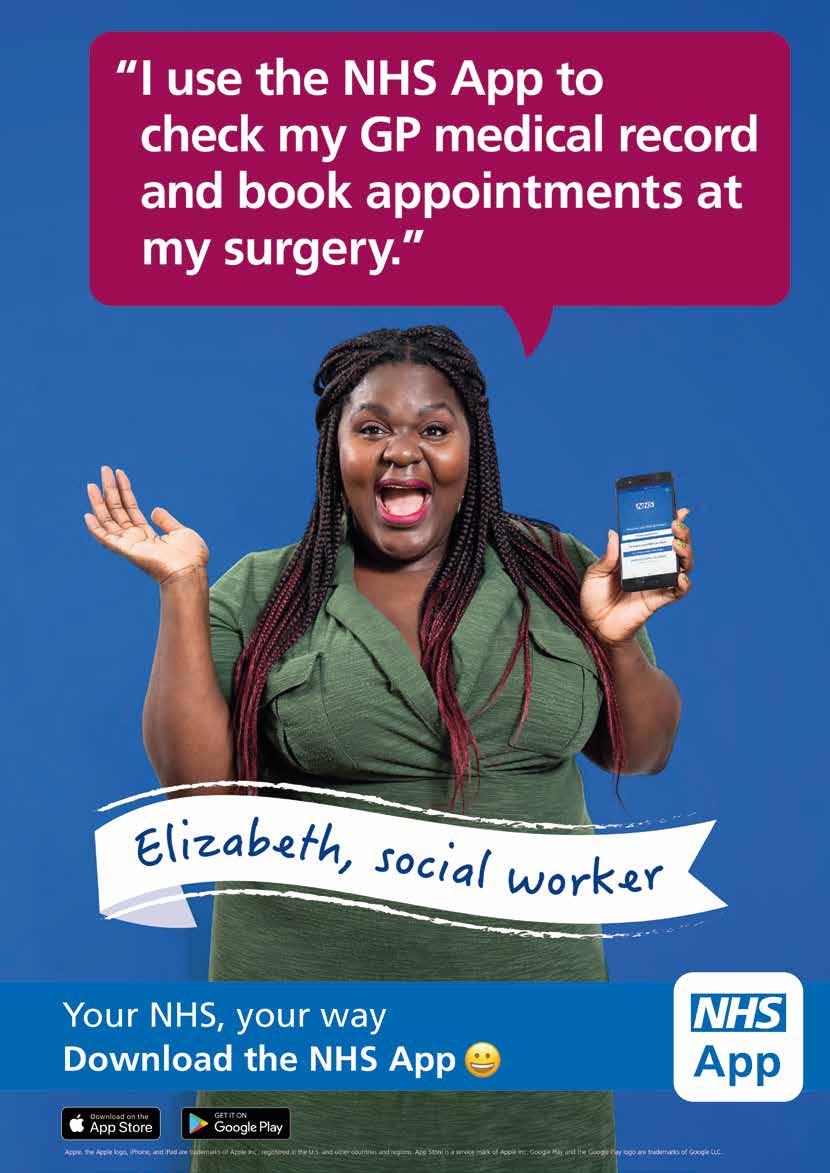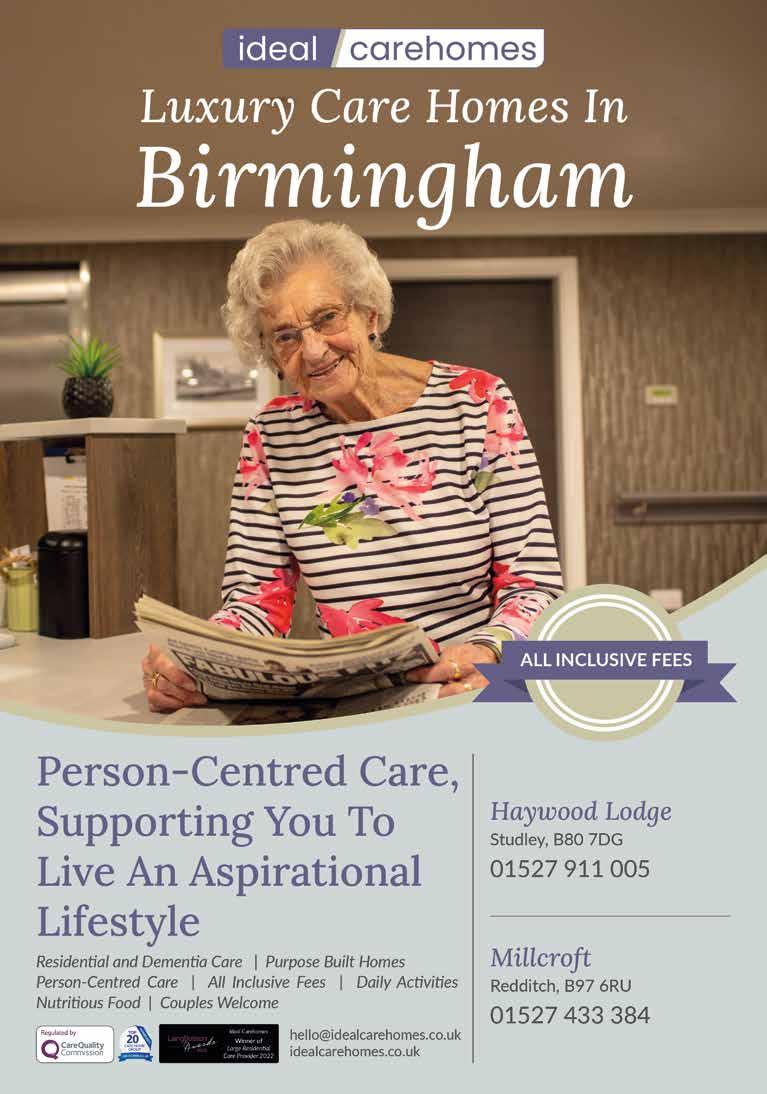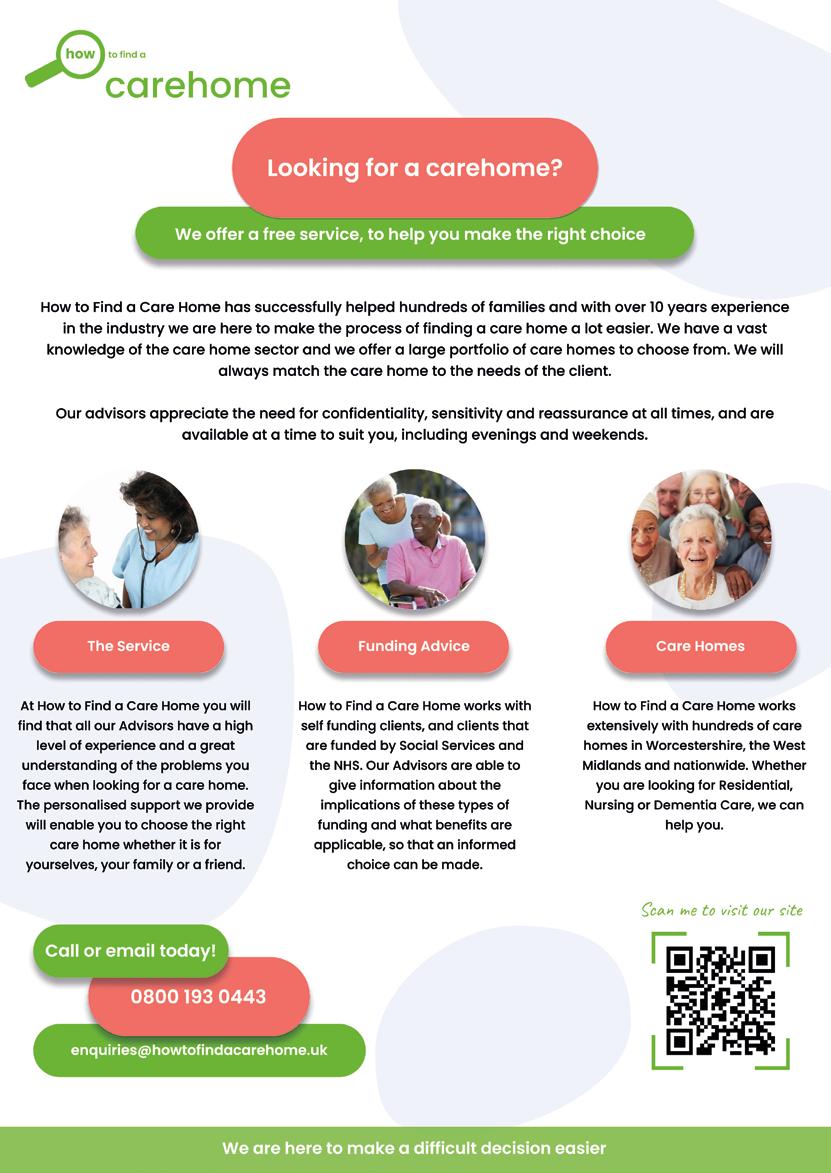A guide to care and independent living

What’s next?
NHS continuing healthcare
SOCIAL CARE tips









SOCIAL CARE tips










Bryony House was established in 1955 with one very clear objective; to create a home within a home for every resident.
Standing in attractive gardens in the Bournville Village Trust, Bryony House is an independent registered charity providing a safe, secure environment and high standards of accommodation and support for elderly residents.
• Safe, secure accommodation
• Homely relaxed atmosphere
• Leisure activities provided
• Homemade fresh food
• Desirable location
• Extensive, well stocked gardens
• Call system in every room
• High standard en-suite accommodation
• Caring and friendly staff
For information or to arrange a call: 0121 475 2965 or email:
bryonyhouse@googlemail.com
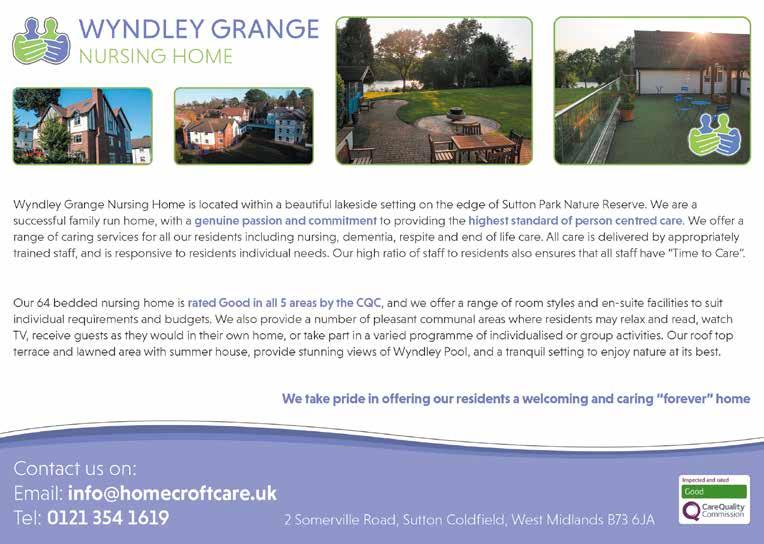
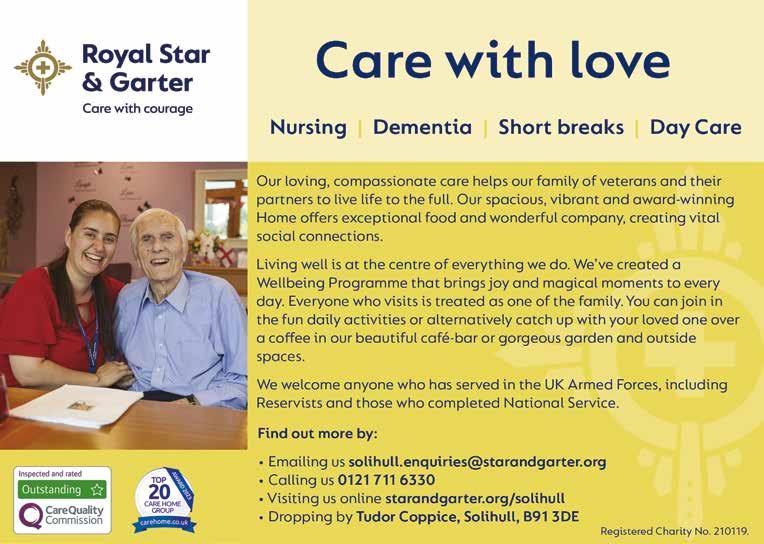

One of Good Hope Hospital’s wards celebrated its fifth birthday with a party for staff, patients and visitors.
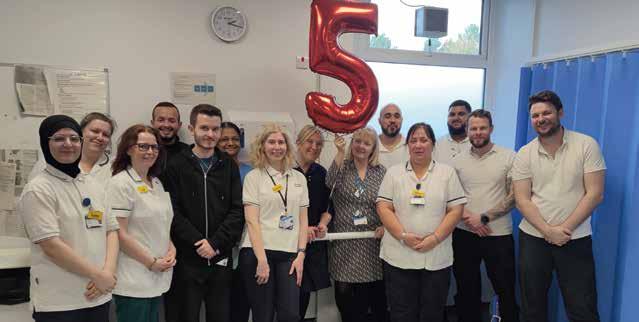
The Homeward Centre is a nurse and therapy-led area which opened in December 2018. It’s one of the largest wards at the hospital with 25 single rooms, therapies rooms, a dining and lounge area for patients to meet, eat and socialise, and a garden space.
When it opened, Homeward represented an investment of £1 million by the Department of Health with The Rt Hon Jacqui Smith officially cutting the red ribbon.
Caroline Graham, Clinical Team Leader in Therapies, said, “We are really fortunate to have Homeward at Good Hope – it plays a huge role in getting patients ready for home, focussing on their independence and achieving good patient outcomes. Our integrated approach, where nursing and therapy colleagues work together alongside our patients, ensures they have the best possible quality of life when they leave our care.”
The birthday party has been a wonderful opportunity to celebrate the past five years
Since opening, Homeward has cared for over 3,200 patients. The centre aims to provide intensive short-term rehabilitation, so that patients who are medically stable but require further therapy or are waiting for transfer to external services can continue therapy in a facility tailored to their needs.
Patients benefit from being encouraged to be as independent as possible, through taking part in exercises, functional tasks and having personalised goals. The ‘home-first’ strategy is underpinned by an integrated nursing and therapy approach to patient care.
Emma Hartill, Associate Director of Nursing, added, “The birthday party has been a wonderful opportunity to celebrate the past five years – to show our appreciation for our hard-working colleagues and volunteers and reflect on all the patients and their families we’ve met and cared for along the way. Here’s to another five years of teamwork and excellent patient care.”
For further information please visit: www.uhb.nhs.uk
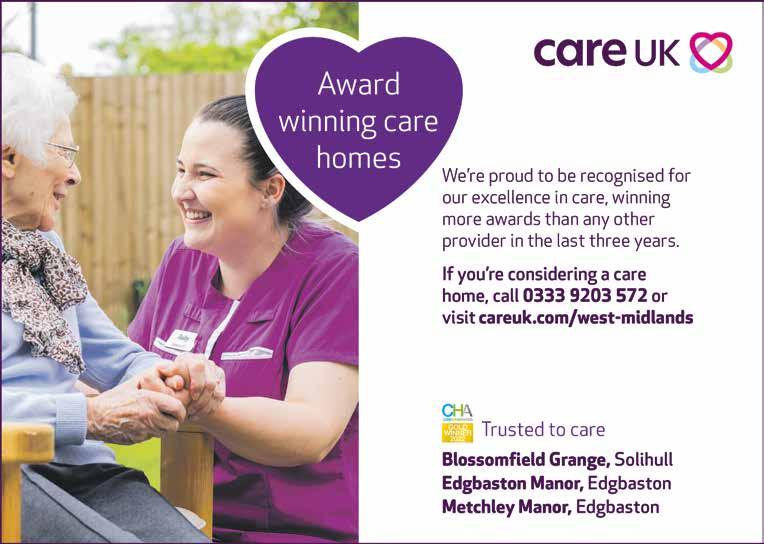


After your stay in hospital we want to help you regain your independence, manage your own care as much as possible and help you to find appropriate support if you need it. We are also here to help if you’ve become a carer for the first time for a family member and want to know about the support available to you.
In this article you’ll find information about a range of support available in Solihull. A great place to start is the Adult Social Care section of Solihull Council’s website. It offers advice and information about services which could benefit you or the person you care for.
solihull.gov.uk/adultsocialcare
If you don’t have access to a computer at home, you can visit your local library to use one. Library staff can also offer support in using the internet and advising where to search.
If you would prefer to speak to someone over the phone or face to face then contact one of our Community Advice Hubs.
There are two Community Advice Hubs in Solihull, based at The Core and Chelmsley Wood Library.

If you don’t have access to a computer at home, you can visit your local library to use one.
The Hubs are run by Age UK Solihull, on behalf of Solihull Council, and are a partnership of local voluntary organisations. They provide high quality information, advice and support for you or the person you care for. Two of the organisations: Carers Trust Solihull and Alzheimer’s Society, are also listed separately below.
The central Solihull Community Advice Hub based on the Lower Ground Floor of The Core is open Monday to Friday 10am to 1pm for drop-in enquiries.
The North Solihull Hub, based at Chelmsley Wood Library is open for drop-in enquiries Monday, Tuesday,
Thursday and Friday 10am – 1pm. Appointments are available at both Hubs at other times.
Visit the Age UK Solihull website
www.ageuksolihull.org.uk or telephone 0121 709 7590 for latest information on opening times.
Carers Trust Solihull is the borough’s lead organisation for unpaid and family carers. It provides an extensive range of services to help support carers of all ages and backgrounds, through expert information and advice.
solihullcarers.org
Email: centre@solihullcarers.org
Phone: 0121 788 1143
Carers Trust Solihull is based at: Solihull Fire Station Annexe, 620 Streetsbrook Road, Solihull B91 1QY
Alzheimer’s Society provides help, advice and guidance for people affected by dementia.
Email: dementia.connect@alzheimers.org.uk
Phone: 0333 150 3456
Solihull Council’s website provides information to help people living with dementia and their families or carers.
solihull.gov.uk/dementia
Solihull Connect is the Council’s customer contact service. There is a dedicated number and email address for Adult Social Care enquiries so you can
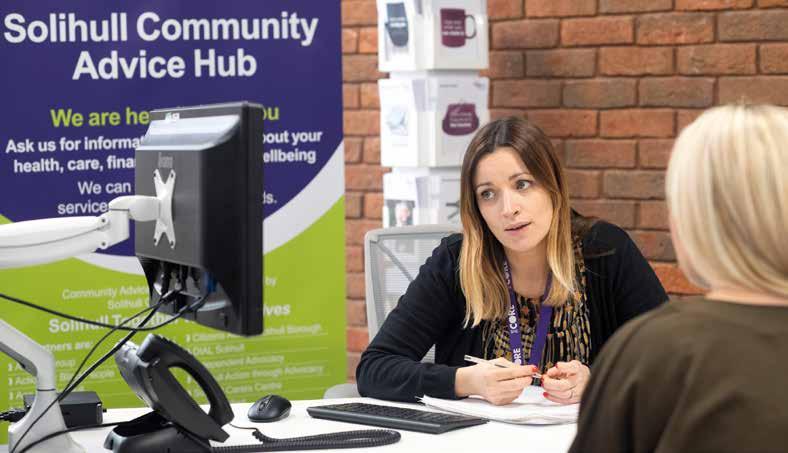
contact our customer service advisors directly and explain your situation.
The advisors can help if you want to request a needs assessment or discuss other topics including staying independent in your own home, getting out and about and carer support. If you need help to understand the assessment or to put your views across, and don’t have family or friends to support you, ask about having an advocate.
Email: ccadults@solihull.gov.uk Phone: 0121 704 8007
Opening hours: 9.00am - 5.00pm Monday, Tuesday, Thursday, Friday and 10.00am - 5.00pm Wednesday
Working in partnership with Solihull Council, the SCH Wellbeing Team deliver a range of services (listed below) designed to help residents of Solihull lead happy independent lives in their own home. The services are provided to all Solihull residents over the age of 18.
Solihull Community Housing offer a free home visit to check for potential hazards that could cause you to slip, trip or fall in your own home.
Falls are often due to hazards that are not easy to see such as loose wires, loose carpets, or poor lighting. After the free assessment you will receive recommendations on how to improve safety in your home. We can arrange for adaptive equipment to be installed, such as grab rails or other low levels aids, which will enable you to be safe and well at home. There will be no charge for this equipment or installation. We may also recommend fitting a chargeable personal alarm system so that you can press a pendant for help in the event of a fall, or assistive technology such as a dementia clock, pills dispenser or smoke detector.
Falls are often due to hazards that are not easy to see such as loose wires, loose carpets, or poor lighting.
• Safe & Sound (pendant & alarm system) with added unique benefit of access to a 24/7 responder service
• low level adaptations
• assistive technology
• handyperson service to help with odd jobs around the home.
To find out which service could be suitable for you please email wellbeing@solihullcommunityhousing. org.uk or phone: 0121 717 1515.
You can also visit the Adult Social Care section of Solihull Council’s website.
SCH also works in partnership with West Midlands Fire Service and Solihull Falls Clinic who we may refer to for further intervention.
For more information call SCH on 0121 717 1515.
Solihull has 13 libraries across the borough, each offering a range of services, advice, help and information to support you. These include Reading Well and Dementia books on prescription. The Home Library Service supports people who can’t get to their local library, by choosing and delivering books once a month.
For more information visit solihull.gov.uk/libraries
Some people with long-term complex health needs qualify for free social care arranged and funded solely by the NHS. This is known as NHS continuing healthcare.
Where can NHS continuing healthcare be provided?
NHS continuing healthcare can be provided in a variety of settings outside hospital, such as in your own home or in a care home.
Am I eligible for NHS continuing healthcare?
NHS continuing healthcare is for adults. Children and young people may receive a “continuing care package” if they have needs arising from disability, accident or illness that cannot be met by existing universal or specialist services alone.
Find out more about the children and young people’s continuing care national framework on GOV.UK
You should be fully involved in the assessment process and kept informed, and have your views about your needs and support taken into account. Carers and family members should also be consulted where appropriate.
A decision about eligibility for a full assessment for NHS continuing healthcare should usually be made within 28 days of an initial assessment or request for a full assessment.
If you are not eligible for NHS continuing healthcare, you can be referred to your local council who can discuss with you whether you may be eligible for support from them.
If you still have some health needs then the NHS may pay for part of the package of support. This is sometimes known as a “joint package” of care.
Your eligibility for NHS continuing healthcare depends on your assessed needs, and not on any particular diagnosis or condition.
To be eligible for NHS continuing healthcare, you must be assessed by a team of healthcare professionals (a multidisciplinary team). The team will look at all your care needs and relate them to:
• what help you need
• how complex your needs are
• how intense your needs can be
• how unpredictable they are, including any risks to your health if the right care is not provided at the right time
Your eligibility for NHS continuing healthcare depends on your assessed needs, and not on any particular diagnosis or condition. If your needs change then your eligibility for NHS continuing healthcare may change.

The process involved in NHS continuing healthcare assessments can be complex. An organisation called Beacon gives free independent advice on NHS continuing healthcare.
Visit the Beacon website or call the free helpline on 0345 548 0300.

Integrated care boards, known as ICBs (the NHS organisations that commission local health services), must assess you for NHS continuing healthcare if it seems that you may need it.
For most people, there’s an initial checklist assessment, which is used to decide if you need a full assessment. However, if you need care urgently – for example, if you’re terminally ill – your assessment may be fast-tracked.
Being referred for a full assessment does not necessarily mean you’ll be eligible for NHS continuing healthcare. The purpose of the checklist is to enable anyone who might be eligible to have the opportunity for a full assessment.
The professional(s) completing the checklist should record in writing the reasons for their decision, and sign and date it. You should be given a copy of the completed checklist.
For most people, there’s an initial checklist assessment, which is used to decide if you need a full assessment.
The initial checklist assessment can be completed by a nurse, doctor, other healthcare professional or social worker. You should be told that you’re being assessed, and what the assessment involves.
Depending on the outcome of the checklist, you’ll either be told that you do not meet the criteria for a full assessment of NHS continuing healthcare and are therefore not eligible, or you’ll be referred for a full assessment of eligibility.
You can download a blank copy of the NHS continuing healthcare checklist from GOV.UK
Full assessments for NHS continuing healthcare are undertaken by a multidisciplinary team (MDT) made up of a minimum of 2 professionals from different healthcare professions. The MDT should usually include both health and social care professionals who are already involved in your care.
You should be informed who is co-ordinating the NHS continuing healthcare assessment.

The team’s assessment will consider your needs under the following headings:
• breathing
• nutrition (food and drink)
• continence
• skin (including wounds and ulcers)
• mobility
• communication
• psychological and emotional needs
• cognition (understanding)
• behaviour
• drug therapies and medicine
If you’re eligible for NHS continuing healthcare, the next stage is to arrange a care and support package that meets your assessed needs.
• altered states of consciousness
• other significant care needs
These needs are given a weighting marked “priority”, “severe”, “high”, “moderate”, “low” or “no needs”.
If you have at least 1 priority need, or severe needs in at least 2 areas, you can usually expect to be eligible for NHS continuing healthcare.
You may also be eligible if you have a severe need in 1 area plus a number of other needs, or a number of high or moderate needs, depending on their nature, intensity, complexity or unpredictability.
In all cases, the overall need, and interactions between needs, will be taken into account, together with evidence from risk assessments, in deciding whether NHS continuing healthcare should be provided.
The assessment should take into account your views and the views of any carers you have. You should be given a copy of the decision documents, along with clear reasons for the decision.
You can download a blank copy of the NHS continuing healthcare decision support tool from GOV.UK
If your health is deteriorating quickly and you’re nearing the end of your life, you should be considered for the NHS continuing healthcare fast-track pathway, so that an appropriate care and support package can be put in place as soon as possible – usually within 48 hours.
If you’re eligible for NHS continuing healthcare, the next stage is to arrange a care and support package that meets your assessed needs.
Depending on your situation, different options could be suitable, including support in your own home and the option of a personal health budget.
If it’s agreed that a care home is the best option for you, there could be more than 1 local care home that’s suitable.
Your ICB should work collaboratively with you and consider your views when agreeing your care and support package and the setting where it will be provided. However, they can also take other factors into account, such as the cost and value for money of different options.

If your needs have changed, the review will also consider whether you’re still eligible for NHS continuing healthcare.
If you’re eligible for NHS continuing healthcare, your needs and support package will normally be reviewed within 3 months and thereafter at least annually. This review will consider whether your existing care and support package meets your assessed needs. If your needs have changed, the review will also consider whether you’re still eligible for NHS continuing healthcare.
ICBs will normally make a decision about eligibility for NHS continuing healthcare within 28 days of getting a completed checklist or request for a full assessment, unless there are circumstances beyond its control.
If the ICB decides you’re eligible, but takes longer than 28 days to decide this and the delay is unjustifiable,
they should refund any care costs from the 29th day until the date of their decision.
If you’re not
If you’re not eligible for NHS continuing healthcare, but you’re assessed as requiring nursing care in a care home (in other words, a care home that’s registered to provide nursing care) you’ll be eligible for NHS-funded nursing care.
This means that the NHS will pay a contribution towards the cost of your registered nursing care. NHS-funded nursing care is available irrespective of who is funding the rest of the care home fees.
Find out more about NHS continuing healthcare from NHS England.
Q
I have a local authority support package that works well. I’m now eligible for NHS continuing healthcare – will my support package change?
If you’re concerned about changes to your care package because of a move to NHS continuing healthcare, your ICB should talk to you about ways that it can give you as much choice and control as possible. This could include the use of a personal health budget, with 1 option being a “direct payment for healthcare”.
Q
Can I refuse an assessment for NHS continuing healthcare? If I refuse, will I be able to get services from my local authority?
Consent is not needed for completion of assessments (CHC Checklists, Decision Support Tools (inclusive of FNC by default) and Fast Track), or collation and sharing of information with:
• Care Teams
• Health and Social Care Staff
But consent is needed to share personal information collected for, and as part of, assessments (Checklist, Decision Support Tool (inclusive of FNC by default) and Fast Track) with third parties, such as family, friends or representatives, at the beginning of the process. There is a legal limit to the types of services that a Local Authority can provide. If you have any concerns about being assessed for NHS continuing healthcare, the ICB should explore your reasons for this, and try to address your concerns.
If someone lacks the mental capacity to consent to sharing of information with third parties (other than Care Teams or Health and Social Care Staff), the principles of the Mental Capacity Act will apply and a best interests decision may be needed.
Q
My relative is in a care home and has become eligible for NHS continuing healthcare. The ICB says the fees charged by this care home are more than they would usually pay, and has proposed a move to a different care home. I think a move will have a negative effect on my relative. What can we do?
If there’s evidence that a move is likely to have a detrimental effect on your relative’s health or wellbeing, discuss this with the ICB. It will take your concerns into account when considering the most appropriate arrangements.
If the ICB decides to arrange an alternative placement, they should provide a reasonable choice of homes.
Q Is it possible to pay top-up fees for NHS continuing healthcare?
No, it is not possible to top up NHS continuing healthcare packages, like you can with local authority care packages.
The only way that NHS continuing healthcare packages can be topped up privately is if you pay for additional private services on top of the services you’re assessed as needing from the NHS. These private services should be provided by different staff and preferably in a different setting.
You’ll be given a personal budget to spend if your local council decide you’re eligible for help with any social care and support you need. You can request an assessment from the council to establish your needs.
The money in your personal budget can be paid to you, to help you make more decisions about how it’s spent. This is known as a direct payment.
What is a personal budget?
Your personal budget is the amount of money your local council will pay towards any social care and support you need.
The amount of money in your personal budget is decided by your local council after a needs assessment to work out:
• what kind of care and support you need
• how much it will cost
• how much you’re able to afford yourself
If you’re a carer, you may be entitled to receive a personal budget after having a carer’s assessment to see what might help make your life easier.
If you’re a carer, you may be entitled to receive a personal budget after having a carer’s assessment to see what might help make your life easier.
A carer’s assessment is free and anyone over 18 can ask for one.
You can ask the council to either:
• manage your personal budget for you
• pay the money to another organisation – such as a care provider
• pay the money directly to you or someone you choose – this is known as a direct payment
You can also choose a combination of these options. For example, the council could arrange some of your care but send you the rest of the money. This is often called a mixed package or “mix and match”.
The money in your personal budget will be spent for you by the council. They will arrange all your care and support based on your agreed care plan.
They still need to check you’re happy with the care they’re arranging for you.
If your money is paid to another organisation
The organisation you choose, such as your care provider, will speak to the council and arrange the payments.
Sometimes other organisations charge you extra money to arrange payments from the council.
Direct payments give you more flexibility over how your care and support is arranged and provided. For example, you could choose to hire care workers or personal assistants who:
• are always the same people and available when you need them
• speak the same language as you
• have experience working with your care needs
• are a specific person that has been recommended to you
• can help you get to shops or social events

There are many ways you could choose to use the money. It’s your choice as long as you’re spending your personal budget on things that meet your agreed care plan.
Most councils will ask for evidence of how you’ve spent your money every 3 months.
You may decide direct payments are not helpful if:
You should be offered direct payments as an option after your needs assessment.
You can also ask your local council’s social services department about direct payments.
You could also consider having someone else manage your direct payments, for example a friend or family member.
• you’re worried about managing money or the people you employ
• you spend a lot of time in hospital
• you would rather the council arranged your care
If you’re not confident about keeping records or managing the people who care for you, your local council should be able to provide support.
You could also consider having someone else manage your direct payments, for example a friend or family member. You’ll need to set up a trust for payments that are managed by someone else.
The Money Advice Service has information about setting up a trust.
If you choose direct payments, the council will send you the money in your personal budget by either:
• paying it directly into a bank, Post Office, building society or National Savings and Investments account
• sending you a pre-paid card
You can then choose how you spend the money on your own care and support, as long as it matches the care plan you’ve agreed with the council.
The council might ask you to sign a document called a direct payment agreement. This says:
• how the council want you to record your spending –for example, keeping receipts

• your responsibilities as an employer - if you’re paying for a care worker
If you spend direct payments on something that isn’t agreed in your care plan, the council could take the money back or end the direct payments.
If you’re struggling to manage your money
Ask your local council for advice or call the Money Advice Service on 0800 138 7777.
If you want someone else to receive the direct payment
You could speak to the council and agree for the money to be sent to someone who will spend it for you. For example:
• a carer
When choosing an agency, decide what sort of service you’re looking for and the tasks you need help with.
• a friend or family member
• someone else who speaks up for you (an advocate)
You may need to write down how they will spend the money and which decisions they can make for you. This is known as a decision-making agreement.
If you decide to hire a carer or personal assistant yourself, it’s important to know the responsibilities you’ll have as an employer.
Although support from the council should be available, you may need to arrange:
• background checks or references
• tax
• National Insurance
• pension contributions
Read more about employing someone to work in your home on GOV.UK.
Disability Rights UK also have more information on getting a personal assistant.
If you don’t want to become an employer
You could choose to hire care workers through an agency instead. This removes the legal obligations of being an employer, but could:
• cost you more money
• remove some of the benefits - such as having the same person provide your care
When choosing an agency, decide what sort of service you’re looking for and the tasks you need help with. It’s a good idea to contact more than one agency, as they may offer different types of services.
You can find out about local home care agencies by:
• speaking to your local council’s social services department
• contacting the UK Homecare Association

If you’re eligible for NHS-funded nursing care, the NHS will arrange and fund nursing care provided by registered nurses employed by the care home.
There are also organisations that inspect care agencies to see how well they are doing. The Care Quality Commission (CQC) regulates all health and adult social care in England.
You might see a CQC inspection rating when you search online for care home agencies. Their 4 ratings are:
• Outstanding
• Good
• Requires improvement
• Inadequate
You could also search for care home agencies on the CQC website to see their full reports.
Telephone helplines
If you would like support to help you manage your personal budget or direct payments, speak to your council or call:
• the Disability Rights UK personal budgets helpline on 0330 995 0404
• the Age UK advice line on 0800 055 6112 (for older people)
NHS-funded nursing care is when the NHS pays for the nursing care component of nursing home fees. The NHS pays a flat rate directly to the care home towards the cost of this nursing care.
You may be eligible for NHS-funded nursing care if:
• you’re not eligible for NHS continuing healthcare but have been assessed as needing care from a registered nurse
• you live in a nursing home
You should be assessed for NHS continuing healthcare before a decision is made about whether you are eligible for NHS-funded nursing care.
Most people don’t need a separate assessment for NHS-funded nursing care. However, if you do need an assessment or you haven’t already had one, your integrated care board (ICB) can arrange an assessment for you.
If you’re eligible for NHS-funded nursing care, the NHS will arrange and fund nursing care provided
How to complain about personal budgets
It’s worth speaking to your council’s social services before making an official complaint to see if they can help.
You still have to the right to complain if you:
• have been told you’re not eligible to receive money towards your care and support
• don’t agree with the amount of money in your personal budget
You could either:
• speak to your social worker about being re-assessed
• call your local council social services and request a complaints form
Your council should also have a formal complaints procedure on its website.
If you’re not happy with the council’s response Contact your Local Government Ombudsman. They investigate all adult social care complaints.
• Age UK have a detailed fact sheet on personal budgets and direct payments in social care
• The Money Advice Service has a guide to direct payments
by registered nurses employed by the care home. Services provided by a registered nurse can include planning, supervising and monitoring nursing and healthcare tasks, as well as direct nursing care.
If you’re not eligible for NHS-funded nursing care and you don’t agree with the decision about your eligibility, ask your ICB to review the decision.
The cost of NHS-funded nursing care NHS-funded nursing care is paid at the same rate across England. In May 2022, the rate was set at £209.19 a week (standard rate) and will be backdated to 1 April 2022.
If you moved into a care home before 1 October 2007, and you were on the previous high band, NHS-funded nursing care is paid at a higher rate. In May 2022, the higher rate was set at £287.78 a week and will be backdated to 1 April 2022. You’re entitled to continue on this rate unless:
• you no longer have nursing needs
• you no longer live in a care home that provides nursing
• your nursing needs have reduced and you’re no longer eligible for the high band, when you would change to the standard rate of £209.19 a week, or
• you become entitled to NHS continuing healthcare instead
You will not be entitled to help with the cost of care from your local council if:
• you have savings worth more than £23,250 – this is called the upper capital limit, or UCL, and will rise to £100,000 from October 2025
• you own your own property (this only applies if you’re moving into a care home)
You can ask your council for a financial assessment (means test) to check if you qualify for any help with costs.
You can choose to pay for care yourself if you don’t want a financial assessment.
You can:
• arrange and pay for care yourself without involving the council
• ask the council to arrange and pay for your care (the council will then bill you, but not all councils offer this service and they may charge a fee)
Having a carer who lives with you costs from around £800 a week. But it can cost as much as £1,600 a week if you need a lot of care.
There are 2 types of care home:
• residential homes have staff that help with everyday tasks such as getting dressed and supply all your meals
• nursing homes also offer 24-hour nursing care
A room in a care home costs:
• around £700 a week in a residential home
• over £850 a week in a nursing home
The price will vary according to where you live and the type of care you need.
For example, serious health problems like dementia and chronic obstructive pulmonary disease (COPD) can increase the cost.
Even if you choose to pay for your care, your council can do an assessment to check what care you might need. This is called a needs assessment.
Even if you choose to pay for your care, your council can do an assessment to check what care you might need. This is called a needs assessment.
For example, it’ll tell you whether you need home help from a paid carer for 2 hours a day or 2 hours a week and precisely what they should help you with.
The needs assessment is free and anyone can ask for one. How
Social care can be expensive. Knowing how much you’ll have to pay will help you budget.
A typical hourly rate for a carer to come to your home is around £20, but this will vary depending on where you live.
You may be eligible for benefits, like Attendance Allowance and Personal Independence Payment (PIP), which aren’t means-tested.
You can use them to pay towards the cost of your care.
You won’t have to sell your home to pay for help in your own home.
But you may have to sell your home to pay for a care home, unless your partner carries on living in it.
Sometimes selling your home to pay care home fees is the best option.
But there may be other ways to pay care home fees if you don’t want to sell your home straight away.
Contact your local council about 3 months before you think your savings will drop to below the limit and ask them to reassess your finances.
Equity release lets you take money that’s tied up in your home without selling it. It’s available if you’re over 55.
But you have to pay interest on the money you take out, which can be expensive.
MoneyHelper has more information on equity release.
You can rent out your home and use the income to help pay your care home fees.
A deferred payment scheme
A deferred payment scheme can be useful if you have savings less than £23,250 (or £100,000 from October 2025) and all your money is tied up in your property.
The council pays for your care home and you repay it later when you choose to sell your home, or after your death.
Ask your council if you’re eligible for a deferred payment scheme.
You can get more information from:
• MoneyHelper: deferred payment schemes
• Independent Age: do I have to sell my home to pay for residential care?
You can get unbiased expert advice from a specialist care fees adviser.
They’ll help you compare all your options before you decide what’s right for you.
Find a specialist care fees adviser in your area with:
• PayingForCare, a free information service for older people
• Society of Later Life Advisers (SOLLA) on 0333 2020 454
Telephone help
Get advice on paying for care from:
• Age UK on freephone 0800 055 6112
• Independent Age on freephone 0800 319 6789
• MoneyHelper on freephone 0800 011 3797
If your savings fall below the upper capital limit of £23,250 (or £100,000 from October 2025), your council might be able to help with the cost of care.
Contact your local council about 3 months before you think your savings will drop to below the limit and ask them to reassess your finances.
Councils provide funding from the date you contact them. You won’t be reimbursed if your savings are below the limit before you contact them.
You might be able to get some free help regardless of your income or if you’re paying for your care.
This can include:
• small bits of equipment or home adaptations that each cost less than £1,000
• NHS care, such as NHS continuing healthcare, NHSfunded nursing care and care after illness or hospital discharge (reablement)

When you’re ready to go home, if you are over 50 and live in Birmingham we are here to help and support you.
Often after a spell in hospital it is more difficult to cope with everyday tasks. If you find this is true you may qualify for extra financial help. Our team of advisors are there to provide expert advice and information including welfare benefit calculations, and help to complete forms. They can also answer a wide range of queries or refer you to someone who can help you directly.
Whenever you want to find anything out from a trustworthy source – give us a call on 0121 437 0479.
We support eligible older people to reduce the risks of a fall at home by fitting equipment and making small changes around the house.

What kind of jobs do we do? Our Falls Prevention Officer will visit you at home to discuss safety in your house and the changes you would like to make to increase your confidence and safety at home. We can:
• Fit a key safe.
• Move & assemble furniture.
• Fix toilet seats.
• Complete small carpentry jobs.
• Fit grab and stair rails.
• Carry out security checks.
• Change light bulbs.
• Secure loose carpets/rugs.
• Provide non-slip bath mats.
• Free Energy Checks (draughtproofing and energy saving equipment).
Call us on 0121 437 0033 ext. 1501 or email fallsprevention@ageukbirmingham.org.uk for more information.
• Dementia Support Services
• Business Directory (or visit www.aubdbirmingham.co.uk)

• Wellbeing Activities Programme
• Wills & Lasting Powers of Attorney
• Telephone Befriending
Please telephone or email us (details to the right) for service availability.
Telephone: 0121 437 0033
Telephone: 0121 437 0479 (Information and Advice)
Email: info@ageukbirmingham.org.uk
Web: www.ageukbirmingham.org.uk
Volunteering is a great way to meet new people and be part of the team.
We have lots of opportunities to suit everyone, whatever skills, abilities, and free time you can spare. We have several exciting and varied roles ranging from helping in our shop and day centres to volunteering in our Information & Advice and Later Life Planning Services.
We’re also recruiting Volunteers across our Activity Groups. Volunteering with us means we can continue to provide support for the over 50’s. In return you’ll get the satisfaction of knowing that you are making a real contribution to older people, helping them to “love later life”.
Whilst you are supporting the over 50’s we will be supporting you by giving you training and helping you enjoy volunteering!
For further information please call our Volunteering Team on 0121 437 0033 or email: volunteering@ ageukbirmingham.org.uk.
Charity number: 1138240
Alzheimer’s Society wants everyone affected by dementia to know that whoever you are, whatever you are going through, you can turn to them for support, help and advice.
Dementia Connect, from Alzheimer’s Society, is a personalised support service for anyone with dementia, their carers, families and friends.
We understand that dementia affects everyone differently. So whether you, a loved one, a friend or neighbour needs dementia support, we’re here for you.
We’ll connect you to a whole range of dementia support, by phone, online and face to face. Our highlytrained dementia advisers can help people come to terms with their diagnosis and navigate the complicated maze of health and social care services.
It’s free, easy to access, and offers you the support you need. Whether it’s advice on legal documents, help understanding dementia or someone to talk to when things get tough, we’re here to help.
We can keep in touch with you to make sure you keep getting the support you need. And because we know it’s never easy to tell your story, you’ll only ever need to tell it to us once.
Our dementia advisers are available to talk to on the phone seven days a week. They will listen and give you the support and advice you need, including connecting you to help in your local area and online. We can offer you the option of regular calls so we can keep in touch, to find out how you are and help when things change.

Monday
Thursday

Dementia Connect online support is available round the clock through our website. Answer a few simple questions about yourself, or someone you know, to get personalised, relevant information and advice. From guides on dementia to advice on making your home dementia friendly, get the information about the things that matter to you.
‘The Dementia Adviser was lovely and full of information. Without Alzheimer’s Society and the Dementia Adviser we’d have nothing. She is a major networker and knows everything and everyone local. I feel in charge and empowered.’ Katherine, living with dementia
If you need further support, you can request a call from our dementia advisers, who should be in touch with you within a week. Our online support includes Talking Point, our online community where you can connect with others in a similar situation, and our Dementia Directory where you can search for local services.
Where possible, our local dementia support workers can meet you in person to offer further support, advice and information. They will also connect you to other face to face services in your area, including local support groups.
Notes: Dementia Connect phone and online support is available wherever you live. As the service is new, some parts of the service may not be available in your area just yet.

From Memory Walk and Cupcake Day to challenging yourself in marathons and treks. There’s plenty of ways you can get involved to help raise money. Search ‘get involved’ on alzheimers.org.uk
Our dementia support services are made possible thanks to generous donations from the public. However, you don’t have to join an event or seek sponsorship to do this. Simply head to alzheimers.org.uk and donate what you can to unite against dementia.
At Alzheimer’s Society, we work to amplify the voices of people affected by dementia, to create a world where they get the support and care they deserve. We can’t do this alone. Whether you have dementia, you have a personal connection to dementia or you want to stand with those who do. Together we can make a difference, register to become a campaigner at alzheimers.org.uk
“Dementia can and does affect so many families, including mine.
“My father was diagnosed with vascular dementia and Alzheimer’s disease in the summer of 2012. He passed away in September 2018.

“I wanted to do something to help raise awareness of the condition and tackle the stigma associated, so I reached out to Alzheimer’s Society to see if I could help. It gives me an enormous sense of pride being an Ambassador for Alzheimer’s Society and I feel like I’m making a difference.
“I have also personally enjoyed taking part in fundraising activities like Cupcake Day and Memory Walk, as there is a real sense of togetherness for a good cause.
“For anyone wanting to know how they can help, I’d say get involved. Whatever you can give, be that your time, voice or money, you’ll know you’ve made a difference to the lives of people affected by dementia.”
Meera Syal, actor and Alzheimer’s Society Ambassador


If you are affected by dementia in and would like information and support, contact us:
T: 0333 150 3456
W: alzheimers.org.uk/dementiaconnect
E: dementia.connect@alzheimers.org.uk


The Care Quality Commission is here to make sure health and adult social care services including hospitals, home and residential care as well as GPs in England provide people with safe, effective, high-quality care. We publish independent inspection reports and ratings about services – information you can use when you’re choosing care for yourself, or a loved one.
You can use our website to search for services you might be interested in by geographical area, or by specialism. For example, a care home that might offer specialist care for someone who has dementia. We also welcome your feedback on the care you have received – good or bad. We use this information to help inform our inspections and can alert authorities including local social services, if there are safeguarding concerns about care being provided.
You can visit our website at www.cqc.org.uk to find our inspection reports, or share an experience of care. You can also call us to share an experience of care on 03000 61 61 61. Here are some tips to help you choose your care.
1 The Care Quality Commission (CQC) registers all care homes and home care agencies. You can find out which ones support specific groups of people, such as people with a learning disability or those living with dementia.
2 CQC’s Chief Inspector for Adult Social Care, Andrea Sutcliffe always uses ‘The Mum Test’: is a care home safe, caring, effective, responsive to people’s needs and well-led? In other words, is it good enough for my Mum (or anyone else I love and care for)?
3
4
Look for care homes and home care agencies where the staff involve people who use services and their families and carers, and treat individuals with compassion, kindness, dignity and respect
Whether you are being cared for in your own home or in a residential setting, the staff looking after you need to be skilled, kind and supportive They should also be capable and confident in dealing with your particular needs. You should always feel that their support is helping you to live the life you want to.
5 A care home will be a home for you or your loved one. Residents should be treated as individuals with their likes and dislikes taken into account. Think about whether a home is close enough to family, friends, and community facilities
6
Look at how well-led and managed a home is. What does it have in place to ensure that it delivers high quality care? Does it promote meaningful activity and connect the home with the community?
8
If you or a loved one needs help with day-today care, you can contact your local council’s social services department. They will ‘make an assessment of your needs’ and depending on circumstances, may be able to help you access financial help. For more advice visit Age UK’s website www.ageuk.org.uk/home-and-care.
7 If you would like to organise your care yourself, you can find a care worker or personal assistant through an agency Your local social services department should be able to provide details of approved agencies.
9
10
CQC’s ratings will identify services as: Outstanding H Good ● Requires improvement ● Inadequate ● This will help you make informed choices around your care.
Safeguarding adults who receive social care is everybody’s business. If you are concerned about the safety of a loved one receiving care, contact the service provider in the first instance. You can also contact social services at your local council. If you feel a crime has been committed, contact the police. You can share your safeguarding concerns with us on our website or contact our National Customer Services on 03000 616161.

The Care Quality Commission is here to make sure health and adult social care services including hospitals, home and residential care as well as GPs in England provide people with safe, effective, high-quality care. We publish independent inspection reports and ratings about services – information you can use when you’re choosing care for yourself, or a loved one.
You can use our website to search for services you might be interested in by geographical area, or by specialism. For example, a care home that might offer specialist care for someone who has dementia. We also welcome your feedback on the care you have received – good or bad. We use this information to help inform our inspections and can alert authorities including local social services, if there are safeguarding concerns about care being provided.
You can visit our website at www.cqc.org.uk to find our inspection reports, or share an experience of care. You can also call us to share an experience of care on 03000 61 61 61. Here are some tips to help you choose your care.
1 If you are new to an area you can find details of local GP services such as doctors’ practices, out-of-hours services and walkin centres in our online directory of care services www.cqc.org.uk/content/doctorsgps
2 You can search any of these services by the name of the service, a place name or your postcode at www.cqc.org.uk
After an inspection, CQC publishes its findings in a report on its website. You can use these reports to check and compare services in your area
3 There are already over 1,000 reports about GP practices published on the CQC website.
7
8
CQC rates all GPs to help people make choices about where they get treatment. This will be on a four-point scale:
Outstanding H
Good ●
Requires improvement ●
Inadequate ●
CQC will also look at how specific population groups are treated and give a rating. For instance how well they serve: Mothers, children and young people, vulnerable older people (over 75s) and people with long-term conditions People will be able to choose a GP service that rates highly on the areas that matter to them.
5 CQC launched its new-style inspection reports for GPs – looking at the five key areas SAFE, EFFECTIVE, CARING, RESPONSIVE and WELLLED – you can use the reports to compare local GPs and choose services.
6
4 You can also use these new style inspection reports to find out more about local services and choose the one that is best for your needs.
9
We welcome your feedback (good and bad) on the services you, or a loved one, receives from your GP. You can share information with us online at http://www.cqc.org.uk/share-yourexperience-finder or call us on 03000 61 61 61.
Telephone: 03000 616161 • Web: www.cqc.org.uk
/CareQualityCommission
@CareQualityComm
The Care Quality Commission has not vetted the advertisers in this publication and accepts no liability for work done or goods supplied by any advertiser. Nor does the Care Quality Commission endorse any of the products or services.
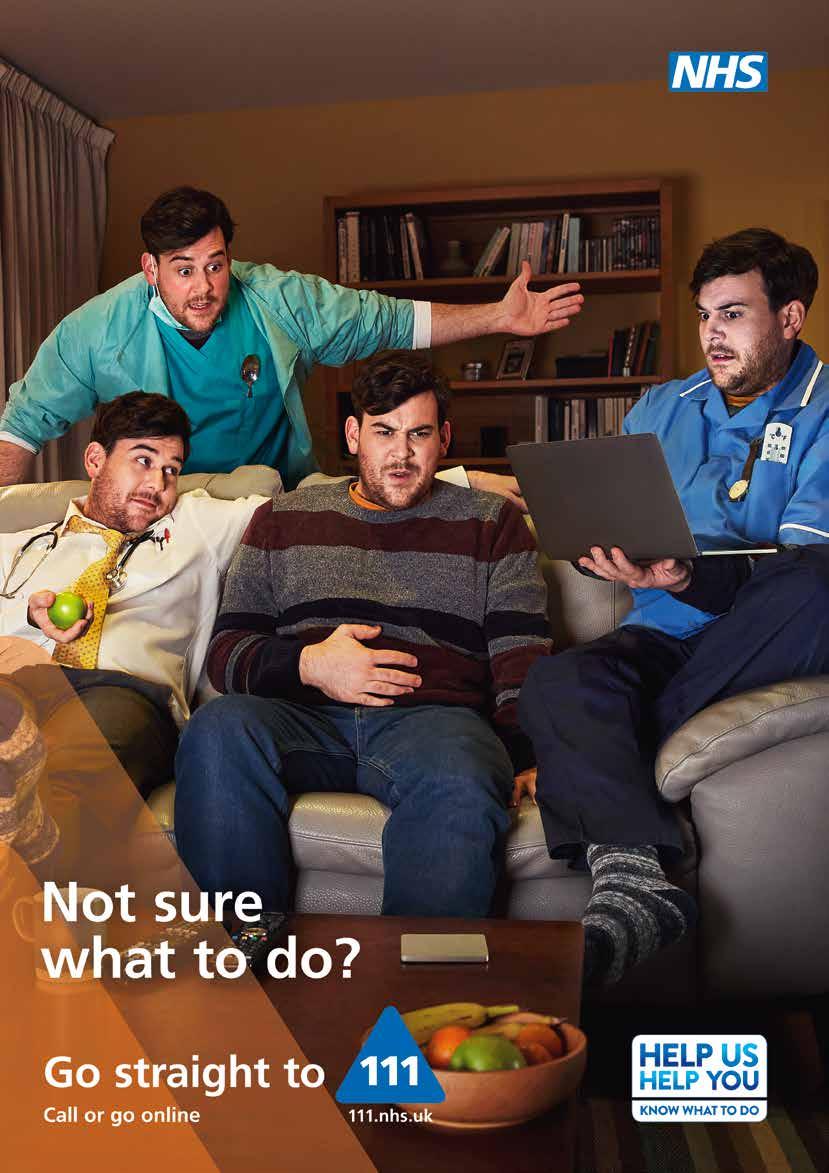
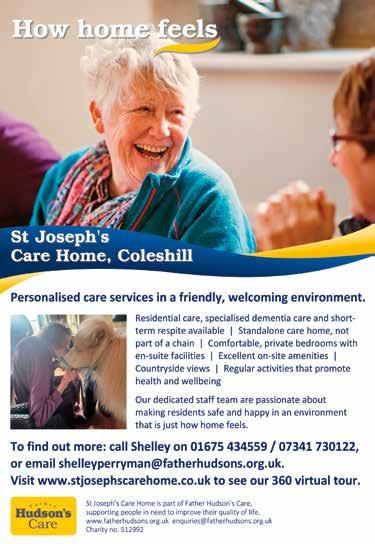






• Professional, personalised 24 hour care in our fully registered Extra Care scheme and our Residential Care Home in Solihull, staffed by a highly trained and professional team.
• Temporary Respite Care facilities for short term care.

• Friendly Independent Living (Sheltered Housing) schemes of one bedroom flats for rent to people aged 55 + who live independently but with the reassurance of living in a safe and supported environment. We have schemes in Solihull, Shirley, Bournville, Wolverhampton, Kidderminster and Erdington. Experienced Wellbeing Support Workers offer support and warden-call monitoring systems operate out of hours.
• Attractive gardens, spacious communal areas and regular social activities, close to local amenities and public transport links.
Enquiries: 0121 245 1002
www.sjmt.org.uk
SJMT, Mason Court, Hillborough Rd, Olton, Solihull, B27 6PF



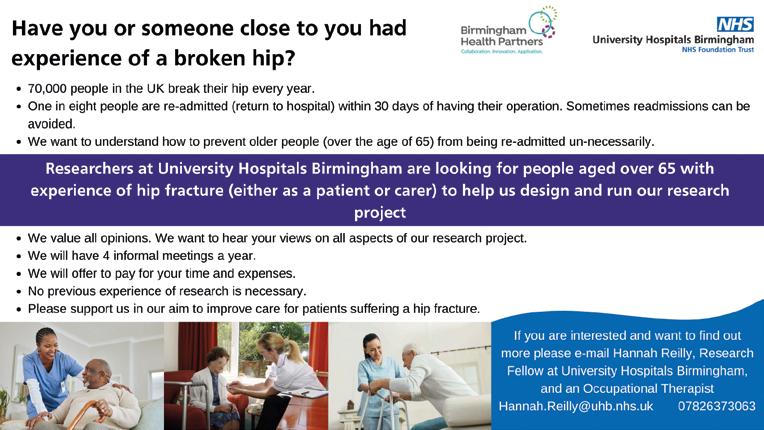
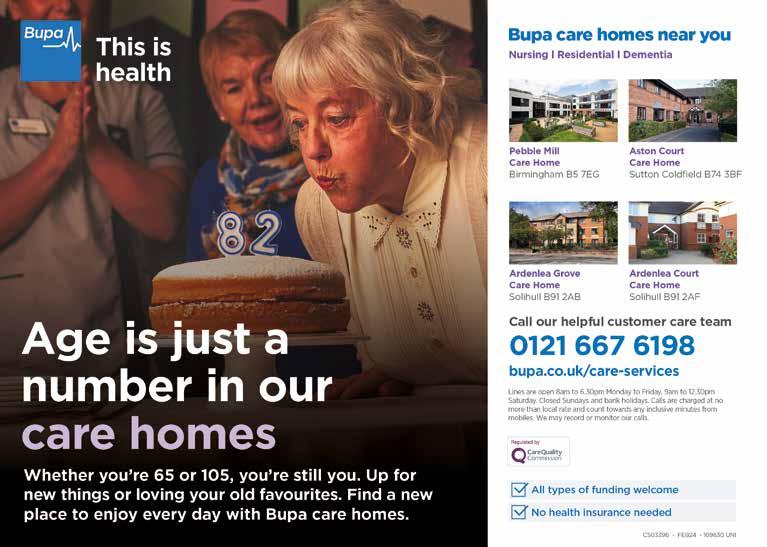
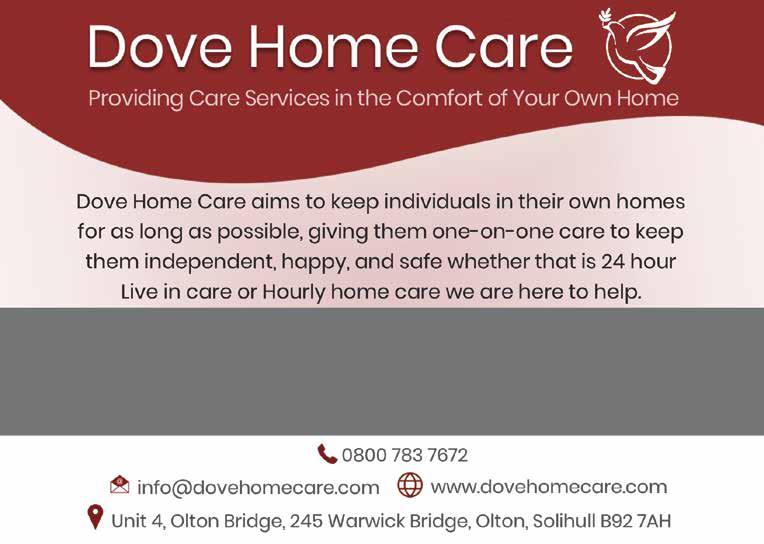
Quality, friendly, compassionate, professional home care in Solihull
• Live in care
• Social support
• Hourly home care
• Medication support
• Support with continence
• Companionship
• Support with hospital discharge
• Shopping
• Providing breaks for existing carers or family members • Domestic duties
